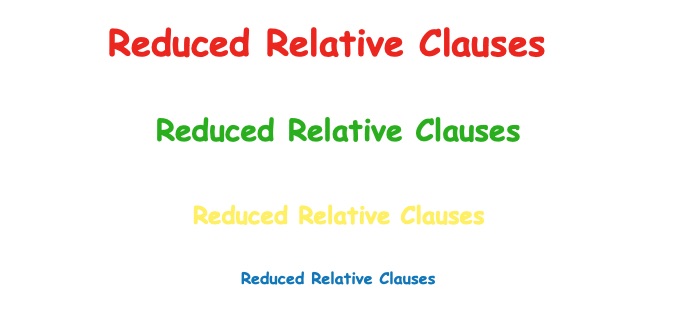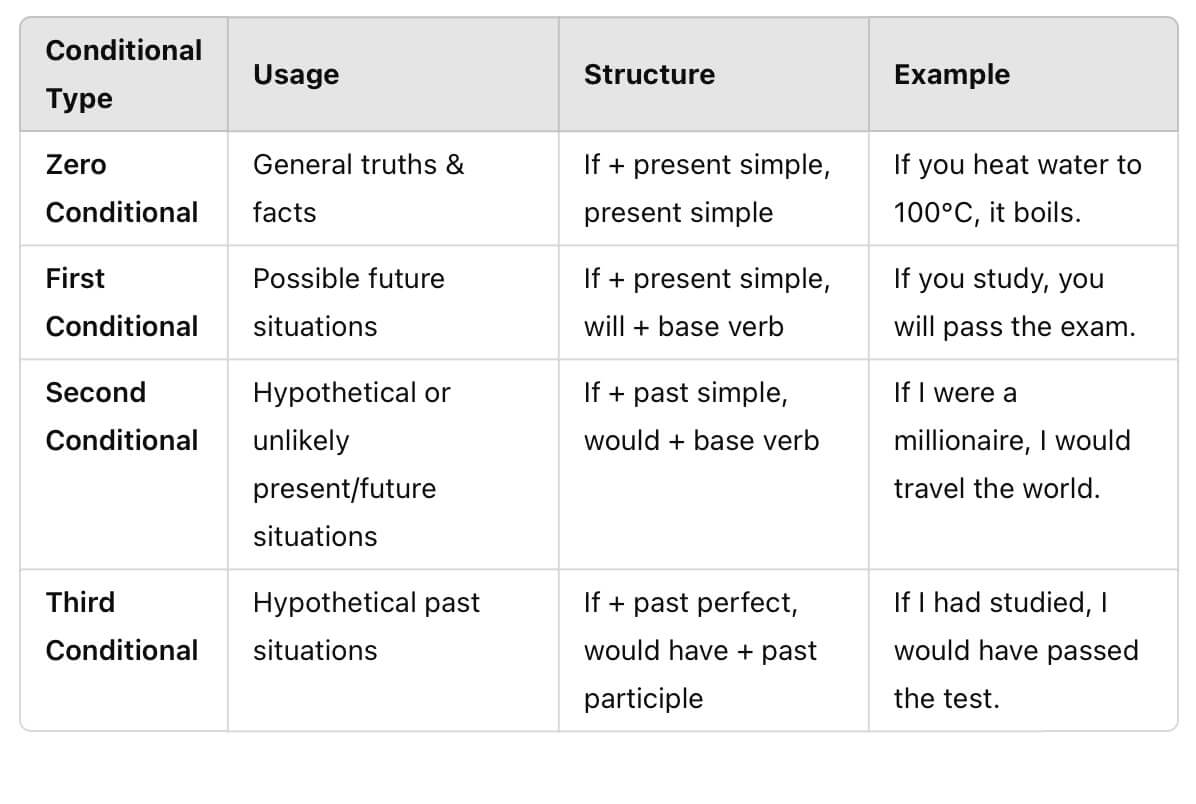- Home
- Relative Clauses
- Reduced Relative Clauses
Reduced Relative Clauses
Reduced relative clauses are shortened versions of relative clauses. They are also known as reduced adjective clauses.
Relative clauses usually modify a noun or noun phrase in the sentence as in this example, where the word 'table' is being modified:
- The table that he bought was for his kitchen
In this reduced clause, 'that' is no longer used:
- The table he bought was for his kitchen
However, it is not always just a matter of omitting the relative pronoun. There are different reduced relative clause rules depending on the sentence involved.

Types of Reduced Relative Clauses
Reduced relative clauses are mainly created through the use of:
- Present participle phrases
- Past participle phrases
- Past Participles
- Prepositional Phrases
- Adjectives and adjective phrases
We'll now look at each of these in turn.
Present Participle Phrases
if the relative pronoun is the subject of the relative clause, then the clause can be reduced to a present participle (verb + ing) phase or past participle (verb + ed) phrase.
If the verb is in the active voice, it gets reduced to a present participle phrase.
Any active tense can be changed to a present participle phrase e.g. present simple, past simple, present continuous, present perfect etc.
To do this you delete the relative pronoun and any auxiliary verbs if there are any, and use the present participle of the main verb. If it is a negative sentence, then we use 'not' at the beginning of the participle phrase.
Note that in these reduced relative clause examples there are a mix of active tenses:
Examples:
Affirmatives:
- The people that exercised every day lost the most weight
- The people exercising every day lost the most weight
- There were many employees who were working very hard
- There were many employees working very hard
- The MPs, who have finally voted, are leaving parliament
- The MPs, having finally voted, are leaving parliament
Negatives:
- The people that did not exercise every day lost the least weight
- The people not exercising every day lost the most weight
It is worth noting at this point that if a non-defining participle phrase refers to the subject of the independent clause, the phrase may be placed either immediately before or after the subject of that independent clause.
So in the case of this sentence, 'having finally voted' refers to the MPs in the independent clause (MPs are leaving parliament), so it can be placed in two positions:
Examples:
- The MPs, who have finally voted, are leaving parliament
- The MPs, having finally voted, are leaving parliament
OR:
- Having finally voted, The MPs are leaving parliament
Past Participle Phrases
Simple Tenses
If the relative clause is in the passive voice and in a simple tense, then it can be reduced by deleting the relative pronoun and the verb 'to be', leaving you with the past participle.
If it is a negative, then you place 'not' at the beginning of the participle phrase.
Examples:
- The new illness, which was discovered by a doctor in Nigeria, has not yet been named
- The new illness, discovered by a doctor in Nigeria, has not yet been named
- The silk, which is imported from Thailand, is worth a lot
- The silk, imported from Thailand, is worth a lot
Continuous Tenses
If it is in the passive voice but is a continuous tense verb (present or past), then you delete the connecting word and 'to be', leaving you with 'being + past participle'.
You then have a continuous passive participle phrase.
Examples:
- The building, which is being built by Kingston Developers, should be completed by May
- The building, being built by Kingston Developers , should be completed by May
Perfect Tenses
If the clause in the passive perfect tense (present or past), then 'have' or 'had' is replaced by 'having'. So we end up with 'having + been' to make the reduced relative clause.
This is a perfect passive particle phrase:
Examples:
- The new Town Hall, which has been designed by TMC Architects Ltd, is expected to receive several awards
- The new Town Hall, having been designed by TMC Architects Ltd, is expected to receive several awards
- Taiwan, which had been one of the first countries to close its borders, showed low numbers of Covid-19 deaths in March
- Taiwan, having been one of the first countries to close its borders, showed low numbers of Covid-19 deaths in March
Again, if the non-defining participle phrase refers to the subject of the independent clause, the phrase may be placed either immediately before or after the subject of that independent clause:
Examples:
- Having been designed by TMC Architects Ltd, the new Town Hall, is expected to receive several awards
- Having been one of the first countries to close its borders, Taiwan showed low numbers of Covid-19 deaths in March
Choosing a Present or Past Participle Phrase
In the case of the perfect tenses, you can choose either a present or past participle, depending on what you wish to emphasise in the sentence.
When to Choose the Past participle
If you wish to emphasise the prior completion of the activity in the participle phrase, 'have' is changed to 'having', leaving you with 'having + past participle'.
You will then have formed a perfect active participle phrase:
Examples:
- The students that have studied the hardest have the best results
- The students having studied the hardest have the best results
So in the above example, it emphasised that the hard studying took place before the best results.
When to Choose the Present Participle
If you do not wish to emphasise in the participle phrase the prior completion of the activity, then it is more common to use the present participle.
In this case 'have' is omitted and the main verb of the relative clause is changed to the present participle.
Examples:
- The students that have studied the hardest have the best results
- The students studying the hardest have the best results
Past Participle
We've been looking at present and past participle phrases, but it should also be noted that we can in cases reduce relative clauses with just a past particle.
We can do this if the sentence has the verb 'to be' or 'to have' and only a past participle. In this case we can move the past participle to before the modified noun.
Examples:
- The car, which had broken down, was by the edge of the road
- The broken down car was by the edge of the road
- The glass, which is stained, needs cleaning
- The stained glass needs cleaning
Prepositional Phrases
If the relative pronoun is followed by a prepositional phrase, then this can be reduced.
Examples:
- The book that is on the table is mine
- The book on the table is mine
- The house which is across the street is for sale
- The house across the street is for sale
- The man who is in the jacket is my cousin
- The man in the jacket is my cousin
Adjective and Adjective Phrases
Adjectives
If the relative clause has only an adjective and the verb to be within it, then the adjective can be placed before the noun, and the relative pronoun (and verb 'to be') can be deleted:
Examples:
- The boy who is oldest won the race
- The oldest boy won the race
- You can carry the box that is lightest
- You can carry the lightest box
- Let's go to the country which is the hottest
- Let's go to the hottest country
Adjective Phrases
If there is a verb other than the verb to be (usually sense verbs such as smell, look, feel, sound etc), then we reduce it to an adjective phrase:
- adjective + verb+ing
Examples:
- The egg, which smelled foul, couldn't be eaten
- The foul smelling egg couldn't be eaten
- I played the song that sounded the best
- I played the best sounding song
- He always wears clothes that look expensive
- He always wears expensive looking clothes
When do we use reduced relative clauses?
Reduced relative clauses can be used to make your writing more concise, so it is common to use them within formal or academic writing, though they can appear in any style of writing.
As the grammatically correct reduction of relative clauses is quite a difficult skill, it is something the examiner in the IELTS test will look out for when awarding a band 7 and above for grammatical range and accuracy.
Note though that this will NOT include reducing relative clauses to propositional phrases, adjective phrases, or adjectives because when you do this you are creating a more simple sentence. However, reduced relative clauses in the form of present and past participle phrases is seen as a higher level skill.
Want to become an expert at relative clauses?
Take the A to Z of Relative Clauses Online Course
New! Comments
Any questions or comments about the grammar discussed on this page?
Post your comment here.





